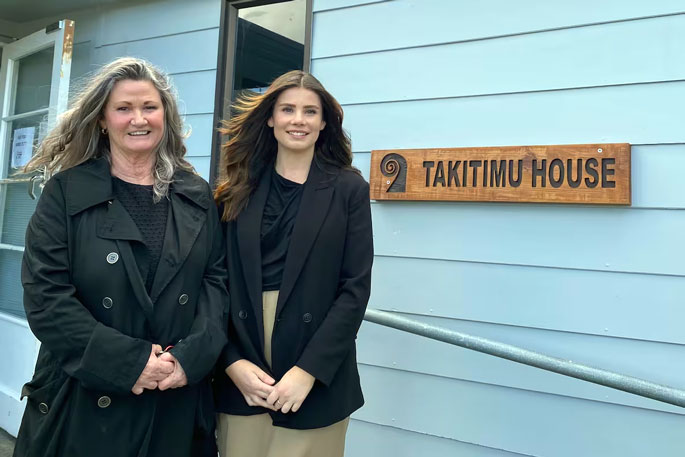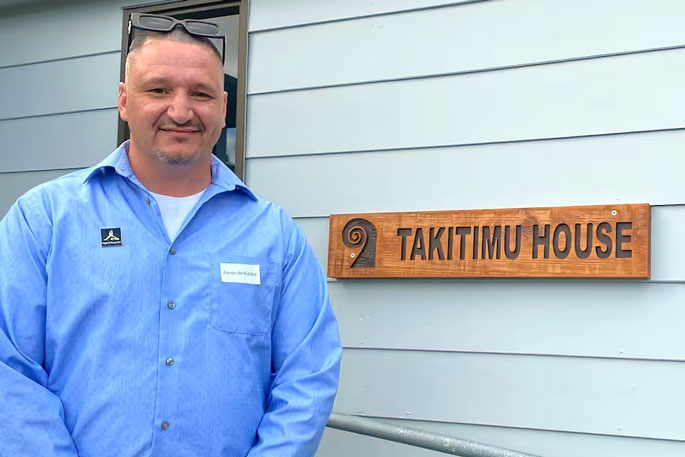Tauranga father Aaron de Ridder had “nowhere to call home” after being released from prison.
His mother, who he planned to stay with, had died and he had “lost everything that mattered” to him.
With a history of recidivist offending and imprisonment, de Ridder was referred to Takitimu House in March 2021 – a transitional housing facility in Tauranga.
After staying there for 16 months, and with the help of Takitimu House staff, he rebuilt his life.
The 43-year-old is now a “proud and contributing member of our community” – he works full-time for Ngāi Te Rangi helping people who struggle with addiction, is an active father to his three daughters, a Takitimu House board of trustee and he lives independently.
“This service is truly one in a million, a beacon of light when you find yourself at rock bottom. I have never known or seen anything like it.”
De Ridder spoke at an event celebrating the 10-year anniversary of Takitimu House on September 4 at the Legion of Frontiersmen Hall – down the road from the facility on Elizabeth St.
In his speech, de Ridder said his journey had not been easy, having faced adversity and battling with drugs and alcohol.
After his release from prison, he heard about Takitimu House. He lived there from March 2021 to July 2022.
“When I arrived ... I was a man with a history of recidivist offending, incarceration, having lost everything that mattered to me.
“With the help of the team, I began to rebuild my life that I wanted and needed.”
Staff helped him and other residents find their strength and “our place in the world that was quite foreign to the one that we had known from our past”, he said.
“More importantly, they helped me rediscover my potential and re-establish my hopes and dreams.”
De Ridder said he discovered love, support, structure, routine, dignity, respect, boundaries “and the freedom to choose”.
“I stayed clean from illicit drugs and distanced myself from risky behaviours and my old associates.”
He reconnected with his children and their mother in a positive way and moved into his own flat in July 2022, where he still lives today.
“I am proud of who I am, I am a proud and contributing member of our community.”
‘I make the most of my life now’
Speaking to the Bay of Plenty Times after his speech, de Ridder said his mother raised him and his seven siblings by herself.
He said he would not have achieved what he has without Takitimu House.
De Ridder said he previously viewed crime and drug dealing “as just normal for me”.
He said he had tried to turn away from that and had a couple of businesses.
“But I always went back to what I knew ... which was drugs and alcohol.”
Now, “life’s awesome”.
He started working at Ngāi Te Rangi in March 2023.
“I love to be able to give back to the community that I took so much from.
“I make the most of my life now. I make the most of every moment I have.”
Takitimu House helps more than 2000 men in 10 years
Before the event, Takitimu House operations manager Annamarie Angus said the 10-year milestone was “a celebration of the outcomes” achieved for its clients.
She said it had helped “in excess of 2000 men” in 10 years.
Angus said men often came with “high and complex needs” such as being recidivist offenders or “in and out” of hospital and the justice system.
Angus said Takitimu House opened its doors in September 2014. The inspiration originated from Tauranga police who saw long-term homelessness in the CBD.
There were “no real services or places” for men to get support to help them transition off the street, she said.
Stakeholders including the police, Tauranga City Council, district health board, Work and Income, churches and housing providers met to discuss the problem and potential solutions.
They invested in a feasibility study to look at indigenous homelessness which became the “blueprint to roll out services”.
 Takitimu House operations manager Annamarie Angus (left) and social worker and 2IC Jess Gamble. Photo / Megan Wilson.
Takitimu House operations manager Annamarie Angus (left) and social worker and 2IC Jess Gamble. Photo / Megan Wilson.
Angus said Takitimu House, which has capacity for 20 people, provided a “roof over their head immediately”.
Its services had developed over time. A social worker had always been on-site, and it engaged with other community organisations such as mental health, budget advice, Kaupapa Māori services, and the courts, she said.
It worked with providers who could help clients “reconnect back into our community” sustainably and long-term.
She said it had a “holistic” approach and addressed physical, mental, and spiritual health, and connectedness.
Angus said the ideal outcomes were “very much client-directed”.
“However, ultimately the goal is to move people back into employment if that’s their pathway and into independent housing in the community ...
“Our model works, we would love to see our model for homeless people replicated across the country.”



0 comments
Leave a Comment
You must be logged in to make a comment.